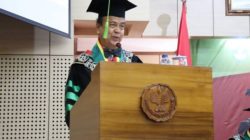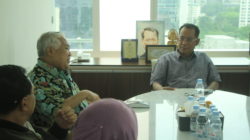Hafid Abbas
International Consultant at SEAMEO RETRAC, Ho Chi Minh, 2014
BPS data (2021) shows Indonesia has a population of 273.9 million, the fourth largest in the world, after China, India, and the US.
It is estimated that 85 million (30.1% of the population) are under the age of 18. It is classified as the age group for primary and secondary education under the United Nations Convention on the Rights of the Child (1989) and the Human Rights Law No. 39/1999.
According to UNICEF (2021), about 68 million students have suffered learning difficulties as a result of the COVID-19 pandemic, which has resulted in the closure of approximately 530,000 schools and children’s study groups. Furthermore, 8.9 million students (BPS, 2021) are unable to attend face-to-face lectures because 4593 PTN and PTS (Dikti, 2021) are also closed.
The COVID-19 Data Center reports that there have been 6,046,796 million cases of COVID-19 in Indonesia from March 2, 2020 to April 30, 2022, with 156,257 deaths. After Vietnam, this is the second worst in ASEAN and the ninth worst in the world.
According to UNESCO and UNICEF (2020), the pandemic’s impact actually reduced education quality and expanded the quality gap between Java and outside Java. It was also stated that 67 percent of the nearly 4 million teachers struggled with digital learning due to inadequate internet access and the lack of a digital learning platform.
In the face of these challenges, it appears that the country’s educational system can develop its own new solutions or learn from other countries by utilizing digital technology to assist students at all levels, types, and methods of learning.
Jakarta Future School: education across frontiers
Raffles School and Raffles College Indonesia established Jakarta Future School (JFS) for primary and secondary education. It presents a real solution for education in Indonesia.
JFS appears to be playing three parts at once. First, JFS is present in the classroom as a substitute for the “face-to-face” education model. What can be achieved through face-to-face learning, JFS can replace it with high-quality online learning. In fact, JFS adopts the International General Certificate of Secondary Education (IGCSE) in the management and learning service so that its graduates can be accepted at any university in the world.
Second, JFS is present as a complement to face-to-face learning. Students can choose any subject to explore further. For example, if there are students from one school who feel that their mathematical mastery still needs to be improved, they can take the subject at JFS as a complement to their school.
Third, JFS appears to be present as an enrichment (updating) of the previous educational process that was carried out face-to-face. For example, in one school, if there are students who feel left behind in one subject they have learned, they can easily choose that lesson as enrichment.
Apart from the three roles of JFS, it can be seen that the teachers who teach at this school are no longer limited by geographical, space and time constraints. There are JFS teachers for example teaching from Argentina, or Dubai. Likewise, there are the students, some of whom learn from Papua, some from Darwin, or from anywhere on the world.
What has been initiated by JFS is an innovative breakthrough (quantum leap) in the world of education whose model can also be adopted by other schools in the country.
Detailed information about JFS is accessible at: www.jakartafutureschool.org
Lecturio: an online platform for medical education
As a result of the COVID-19 pandemic that has hit the whole world, Germany has initiated the birth of online learning technology for medical sciences, dentistry, nursing, and health sciences in the lecturio.com platform.
Lecturio has presented high-quality digital learning technology that is easily accessible, affordable, and tailored to the needs of lecturers and students.
Like JFS, Lecturio can also replace face-to-face lectures that take place at any campus in the country or in any country in the world. Currently, Lecturio has a presence as a platform for medical education. Lecturio uses a curriculum and learning resources with world-class learning quality standards. In fact, there are several countries in Africa that have used Lecturio in full in all their medical education.
Lecturio is also present as a complement to face-to-face lectures for medical students from anywhere and anytime. With its technology, students can take certain courses according to their needs and can even participate in practical activities using three-dimensional digital objects interactively.
Lecturio has the most up-to-date collection of journals and textbooks, which are relatively the same as the library collections of Harvard University, Johns Hopkins, and University College London. There are no fewer than 250 professors and expert doctors, including from the world’s leading medical schools, such as Harvard University, to ensure that there is a guarantee of the quality of lectures held at Lecturio.
Detailed information about Lecturio can be accessed at the site: www.lecturio.com.
UNJ’s Mobile Learning
In his inaugural oration as Professor of Chemistry Learning Management, Faculty of Mathematics and Natural Sciences, UNJ, on October 7, 2021, Ucu Cahyana raised the issue of the Integration of Pedagogical Frameworks on Mobile Learning in Learning Management: Alternatives to Improve Science Literacy. Ucu assessed that scientific literacy is one of the six basic literacies agreed upon by the World Economic Forum in 2015 and is important for students as a prerequisite for 21st century life skills.
The use of digital mobile learning is actually needed not only in science learning but in all subjects at the primary and secondary education levels. This approach is considered very suitable for the geographical and demographic conditions of Indonesia, as the largest archipelagic country in the world with the fourth largest population in the world. In addition, Indonesia has land borders with three neighboring countries, namely Malaysia, Papua New Guinea and Timor Leste, and sea borders with ten countries, namely: India, Singapore, Malaysia, Thailand, Vietnam, Philippines, Palau, Australia, Timor Leste, and Papua New Guinea.
As a country that has a border as wide as one-eighth of the planet Earth’s equator with three different time zones, the border is in the leading position, the outermost one, which is generally left behind (3T). Therefore, the implementation of mobile learning in learning requires good learning management in accordance with pedagogical principles and learning management.
There are four main reasons that are considered to underlie the development of mobile learning at UNJ, namely: (1) in the past, in the 70s, when it was still called IKIP Jakarta, UNJ became a think-tank for preparing Indonesian Education Television broadcasting programs; (2) UNJ has the vision of becoming a reputable university at the global level (a world-class university) which now and in the future will pay special attention to the development of digital technology-based learning; (3) UNJ has advantages in the realm of education and teacher training in the development and utilization of mobile learning for all subjects; and (4) UNJ has a laboratory school from kindergarten, elementary, junior high to high school levels whose roles are like hospitals for medical students.
With the presence of JFS, Lecturio, and Mobile Learning at UNJ, Indonesia should be able to continuously innovate in providing the best, quality, conveniently accessible, and affordable education services for all students and citizens. Education is for all, and everyone is responsible for the progress or downfall of education today and in the future. Education for All and All for Education.





